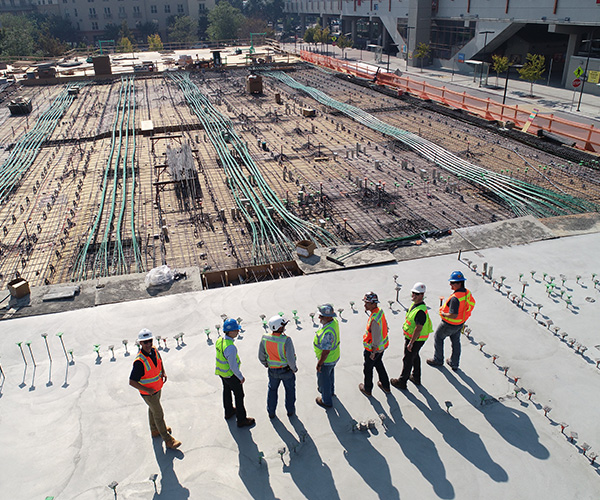Guiding Contract Workers in Construction Towards Permanent Employment
WEBUILD STAFFING BLOG |
Guiding Contract Workers in Construction Towards Permanent Employment

Contract Workers in construction jobs often serve as a gateway for talented individuals to enter the industry, gain valuable experience, and showcase their skills. While a contract workers position offer flexibility and short-term opportunities, many workers aspire to secure permanent roles that provide stability, benefits, and long-term career growth. Navigating the transition from temporary to permanent employment in construction can be complex, requiring careful planning, skill development, and strategic networking.
So let’s explore the journey of contract workers in construction and provide insights and strategies for successfully transitioning to permanent roles.
Understanding the Landscape of Contract Workers in Construction:
Contract work is a common practice in the construction industry, where project-based engagements, seasonal demand, and fluctuating workloads are the norm. Contract workers, often referred to as freelancers, temporary employees, or independent contractors, play a vital role in filling short-term staffing needs, supplementing core teams, and delivering specialized expertise on construction projects. While contract work offers flexibility, variety, and exposure to different projects and companies, it may lack the stability, benefits, and career advancement opportunities associated with permanent employment.
Challenges Faced by Contract Workers:
Contract workers in construction face several challenges as they navigate their career paths and seek to transition to permanent roles:
- Lack of Stability: Contract positions are typically temporary in nature, with limited job security and uncertain future prospects. Contract workers may face periods of unemployment between projects and experience financial instability as they seek their next opportunity.
- Limited Benefits: Contract workers often lack access to benefits such as health insurance, retirement plans, paid time off, and professional development opportunities. This can impact their overall well-being, financial security, and long-term career prospects.
- Difficulty Establishing Relationships: Contract workers may struggle to establish lasting relationships with employers, coworkers, and industry contacts due to the transient nature of their engagements. Building a strong professional network and reputation can be challenging when moving between projects and companies frequently.
- Limited Career Advancement: Contract workers may encounter barriers to career advancement and progression, as permanent roles often require specific qualifications, experience levels, and tenure with a company. Contract positions may not provide opportunities for skill development, mentorship, or leadership roles.
Contract Workers Strategies for Transitioning to Permanent Roles:
While transitioning from temporary to permanent employment in construction may present challenges, there are several strategies that contract workers can employ to increase their chances of success:
- Demonstrate Value and Reliability: Showcase your skills, work ethic, and reliability to employers by consistently delivering high-quality work, meeting project deadlines, and exceeding expectations. Demonstrate your commitment to the company’s success and willingness to go above and beyond in your role.
- Seek Feedback and Professional Development: Seek feedback from supervisors, mentors, and colleagues to identify areas for improvement and opportunities for growth. Invest in professional development opportunities, such as training programs, certifications, and industry conferences, to enhance your skills and qualifications.
- Build Relationships and Network: Build strong relationships with colleagues, supervisors, and industry contacts to expand your professional network and access new opportunities. Attend industry events, join professional associations, and participate in networking groups to connect with potential employers and mentors.
- Express Interest in Permanent Roles: Communicate your interest in transitioning to a permanent role with your employer or staffing agency. Express your commitment to the company’s long-term goals and your enthusiasm for contributing to its success. Be proactive in seeking out permanent job openings and expressing your interest in applying for them.
- Highlight Transferable Skills and Experience: Highlight your transferable skills, experience, and accomplishments on your resume and in job interviews. Emphasize how your previous contract work has prepared you for a permanent role and how you can add value to the company’s team and projects.
- Stay Flexible and Open-Minded: Be flexible and open-minded in your job search, considering opportunities for permanent employment in different companies, roles, and locations. Be willing to adapt to changing circumstances and explore new avenues for career advancement and growth.
- Negotiate Fair Compensation and Benefits: When transitioning to a permanent role, negotiate fair compensation, benefits, and employment terms that align with your skills, experience, and market value. Advocate for yourself and ensure that you are being compensated appropriately for your contributions and qualifications.
Real-Life Success Stories:
Several contract workers in construction have successfully navigated the transition to permanent roles, achieving long-term career success and fulfillment. Here are some real-life success stories:
Sarah’s Journey:
Sarah began her career in construction as a contract worker, taking on short-term assignments to gain experience and build her skills. She demonstrated exceptional performance and reliability on each project, earning praise from supervisors and colleagues. When a permanent role became available at a construction firm where Sarah had previously worked, she expressed her interest in the position and was hired based on her proven track record and positive reputation within the company.
John’s Path to Advancement:
John started his career as a temporary laborer on construction sites, performing basic tasks such as cleaning, material handling, and site preparation. He took advantage of training opportunities provided by his employer to develop his skills and pursue certifications in construction trades. Over time, John’s hard work, dedication, and commitment to learning paid off, and he was promoted to a permanent role as a skilled tradesman with opportunities for further advancement and career growth.
Transitioning from temporary to permanent employment in construction requires resilience, determination, and strategic planning. By demonstrating value and reliability, seeking feedback and professional development, building relationships and networking, contract workers can increase their chances of securing permanent roles and advancing their careers in the construction industry. While the journey may be challenging, the rewards of stability, opportunity, and fulfillment make it well worth the effort.
Webuild Staffing Agency is a leading executive search and staffing agency dedicated to the construction, engineering and environmental industries. To learn more please visit: www.webuildstaffing.com










